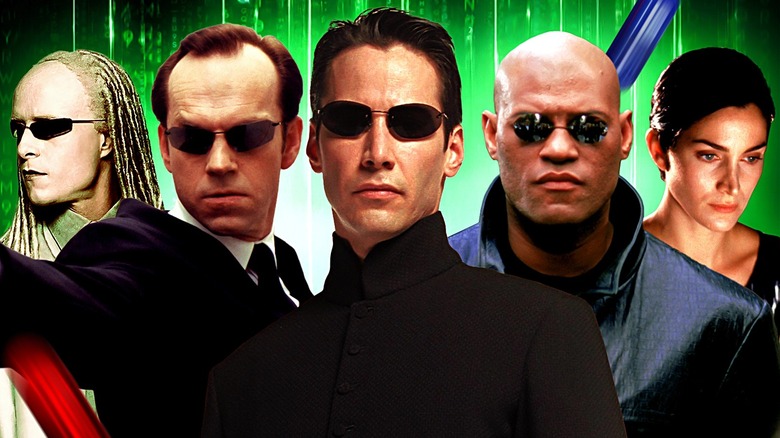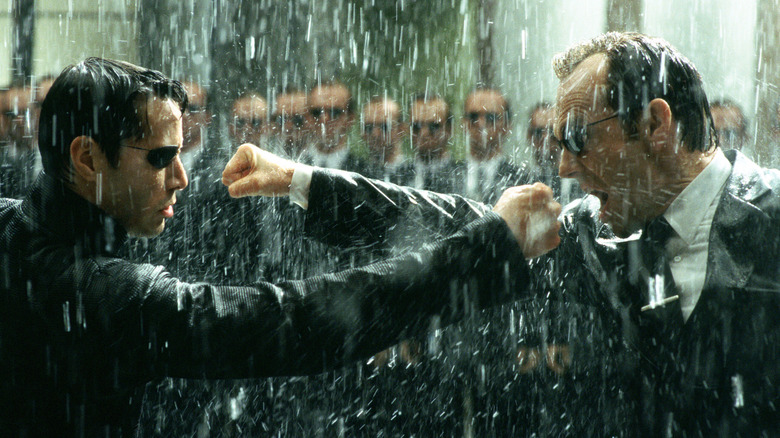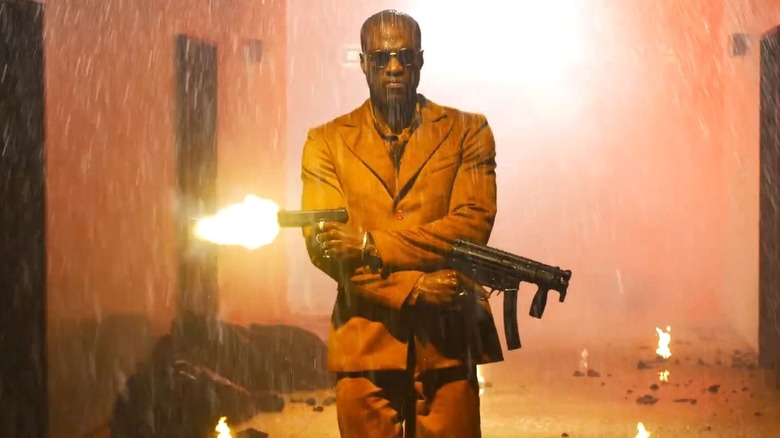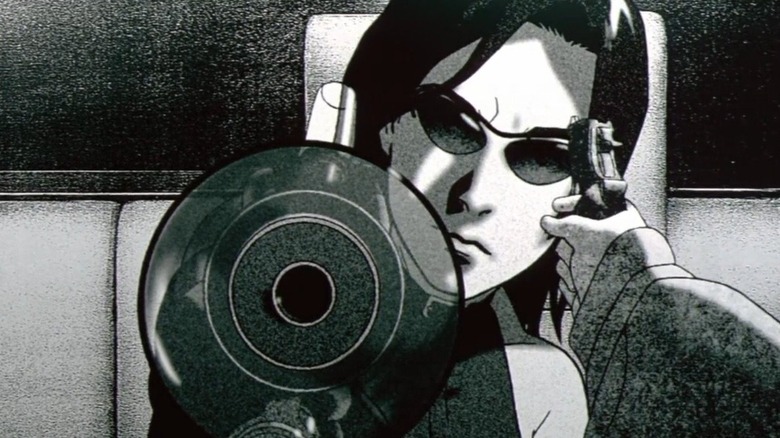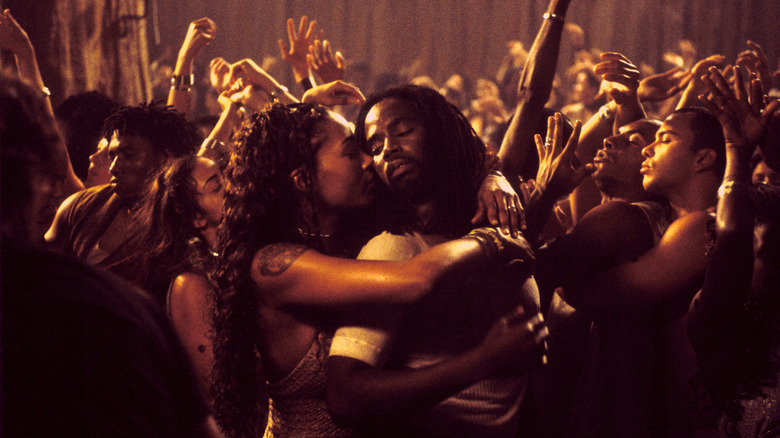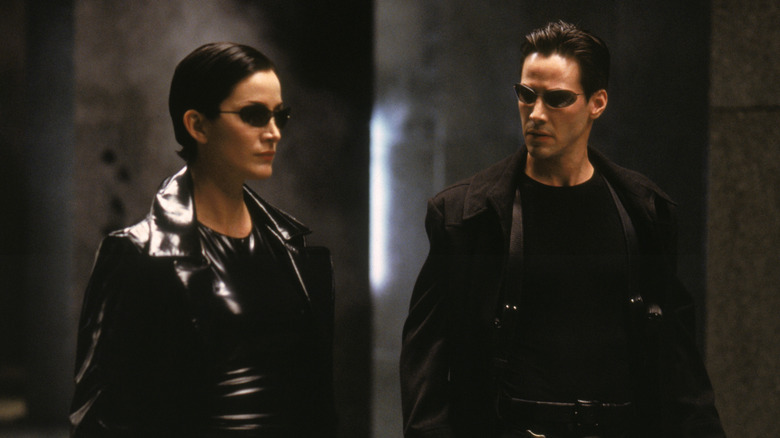Every The Matrix Movie, Ranked From Worst To Best
Short of "Star Wars" and "Star Trek," you'd be hard-pressed to find a science fiction franchise of the modern era more influential than "The Matrix." Did the Wachowskis' 1999 magnum opus take major inspiration from prominent anime and cyberpunk stories? Yes, but it blended those with a distinct philosophical angle, strong style choices, and an approach to action that completely revolutionized the Hollywood blockbuster.
Though the films that followed were more controversial, don't believe the lie that "The Matrix" is the only part of the franchise worth watching. Each piece brings new ideas, memorable moments, and serves a key role in the larger ideological narrative of "The Matrix." They may be less straightforward than the original, but in some ways, that only makes them more intriguing.
Today, we're ranking all of the "Matrix" movies, including the 2003 animated anthology film "The Animatrix." Each is a success in its own right, but some stand taller than others. Let's get into it.
5. The Matrix Revolutions
Before anyone gets upset, let's run down some of the things that "The Matrix Revolutions" does incredibly well. As a climax to the overarching story of the original trilogy, it's pitch–perfect, delivering a fantastic finale for Neo (Keanu Reeves) and his arc across the first three films. His battle against Agent Smith (Hugo Weaving) is everything you could hope for — bombastic, explosive, and filled with deeper meaning. Neo's victory isn't just one of strength, but one of conviction, bringing to bear the trilogy's overriding emphasis on humanity's inherent perseverance.
Everywhere else, though, the movie falls a little short. It can be tough to stick the landing on a trilogy, and "Revolutions" puts so much emphasis on climaxing the series as a whole that it fails to craft a cohesive identity as an independent film. The battle for Zion, while technically impressive for the time, drags heavily as the film goes on because the characters we follow through it just aren't built out as well as others in the franchise. The visual flair of the digital world is lost for most of "Revolutions," replaced with a techno-apocalypse aesthetic that just isn't nearly as compelling.
There are smaller details I could nitpick, like how the death of Trinity (Carrie-Anne Moss) feels more preordained by the Hero's Journey playbook than fully earned in the context of the film itself. But the big picture is that "Revolutions" feels like a whole lot of filler just to get us to the big fight between Neo and Smith. Because that fight works, the film finishes off the trilogy just fine, but you may find yourself revisiting their duel on YouTube more frequently than rewatching the entire film.
4. The Matrix Resurrections
In a way, "The Matrix Resurrections" is like the inverse of "Revolutions." Rather than having a lot of filler at the start but a fantastic finale, it starts almost impossibly strong but ends on an empty note. The first hour of "Resurrections" is just incredible — full of smart meta commentary, gorgeous shots, cool new ideas about the digital world, and stellar performances. Reeves is excellent as an older, discombobulated Neo, and things get exciting right away with the introduction of Jessica Henwick as Bugs and Yahya Abdul-Mateen II as a new version of Morpheus — both of whom do excellent work throughout.
"Resurrections" also scores points for putting a middle-aged love story at the center of the story. It's something you don't see a lot in sci-fi/action Hollywood, and the whole arc of Neo and Trinity rediscovering each other and fighting back against the system is great.
The problem is that once you get into the film's back half, it leaves behind some of its most interesting ideas in favor of a pretty flat "fight the power" story. Neil Patrick Harris and Jonathan Groff are giving it their all, but their combined powers just don't equal the imposing malice of the original Agent Smith. "Resurrections" ends on a note that feels super rushed, as if the filmmakers decided late in the process to wrap up every possible loose end. It's an unsatisfying finish to a mostly great movie.
3. The Animatrix
You could argue that "The Animatrix" doesn't really qualify for this list. Due to its unique structure as an anthology film, it could technically be watched piece by piece. However, the film's totality is actually super important to what it's trying to do — and what it's trying to do is really, really cool.
Released in 2005, two years after the end of the trilogy in cinemas, "The Animatrix" brings together the Wachowskis' cyber world with the Japanese anime creators who inspired it. The film consists of various shorts, each with a different animation style, with a star-studded roster of directors, animators, and writers in play. And yet, these are much more than vignettes. As a whole, the film fills in the gaps of the original trilogy, revealing how humanity first created machine sentience, turned against it, and eventually succumbed to its superior strength. We get stories from the perspective of the machines, as well as numerous escapades across the "Matrix" timeline from both within and outside of the Matrix.
Freedom, discovery, compassion, violence, control, humanity, the ascension of the soul — all of these core ideas from the larger franchises are explored here, and the gorgeous aesthetics help them resonate even louder. Every frame of the film is an art piece, anchored by yet another incredible score from original trilogy composer Don Davis, who turns in some of his best work ever. This isn't just a collection of side stories — it's an artistic complement that makes the whole series richer. Like "The Clone Wars" to the "Star Wars" prequels, or in a grander sense, "The Silmarillion" to "The Lord of the Rings," "The Animatrix" adds depth, texture, and numerous memorable moments to an already complex universe. And while it may not be as cohesive or expensive as the first two movies on this list, it also doesn't have their lows.
2. The Matrix Reloaded
By the time I first watched the "Matrix" movies around 2010, the consensus online was that "Reloaded" wasn't very good. The "Star Wars" prequels had created a specific kind of mob hate language on the internet, which fueled message boards and the early days of YouTube. "Reloaded" became grist for that unfortunate mill, but like many of the sentiments around the "Star Wars" prequels at the time, the prevailing opinion on "The Matrix Reloaded" was not at all accurate.
This movie is fantastic. It was then, and it remains so now. The infamous Zion orgy/rave scene that got so much guff back in the day is in fact one of the most important in the series — a sequence that emphasizes what exactly humanity is fighting for amidst the cold assimilation of digital life. The action scenes are stranger and more absurd, but that's to their benefit. If you allow yourself to be taken by the tide of bold choices in "Reloaded," you're going to have an incredible time.
More to the point, this is where the philosophical crux of the series really comes into full focus. The first film has a lot of interesting things to say about the nature of perception, freedom, and the machine age, but "Reloaded" injects a strong deconstructionist message that shakes everything up. Many people didn't like this at the time, the way the film seemed to "undo" aspects of its predecessor. But really, the complications of "Reloaded" only make the first film stronger, detaching it from the big mythopoetic tropes it embraced and adding a new, more complex layer on top.
1. The Matrix
As much as the "Matrix" sequels are better than people give them credit for, this is till an instance where the original remains the best. No film since "Star Wars" has been as impactful for the science fiction genre in Hollywood — not "Terminator," "Alien," "Avatar," none of them. For the better part of a decade, this is what other directors were trying to evoke — the slick, effortless style and bold visual flair.
No one ever quite nailed it, perhaps because they lacked the Wachowskis' singular artistic vision. While "The Matrix" caught on immediately because of the bullet time, leather coats, and catchy lines, it's the deeper level that's made it a timeless classic. Overdramatic? Absolutely, but with a purpose. The Wachowskis are playing in the epic space here, and "The Matrix" is the rare example of someone actually pulling that off while also adding something new to the mix.
"The Matrix" blends a ton of different genres, and each one just works. The noir cyberpunk thriller of the first act builds the tension and sets the stage for the big reveals to come, and the second act of spirituality, martial arts training, and sci-fi worldbuilding makes good on every promise made in act one. In the third act, "The Matrix" takes the gloves off and lays out a series of action set pieces directors are still trying to match today. And that final shot? Come on. You just can't beat it.
